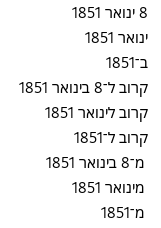How do I interpret “ב־1851” ? You seem to have it meaning “1851”, “estimated 1851” and “calculated 1851”.
We would usually write the output of the date displayer in a format that can be read by the date parser.
How do I interpret “ב־1851” ? You seem to have it meaning “1851”, “estimated 1851” and “calculated 1851”.
We would usually write the output of the date displayer in a format that can be read by the date parser.
This is what I get for a simple date, from, to, before, after, about, span and range:

The string that is being used for about, בקרוב, is coming from the Weblate translation. You can change this.
For the period you have a “Fail”, but haven’t filled in the expected column.
When should we prefix a normal date? Just when it is a year, or also month and year? I assume that this is because the date is not precise.
I’m still looking for a some proper words for about, estimated, calculated and normal that will behave the same way all across to avoid handling each date type separately. i.e to prefix a standalone year in three different ways.
Since I can change the translation on weblate, lets use " בשנת" like so yyyy _“בשנת”.
We have 8 modifiers: None, Before, After, From, To, Range, Span and About.
We also have 3 qualifiers: None, Estimated and Calculated.
We also know the precision of the date: yyyy or mm-yyyy or dd-mm-yyyy.
That gives us 72 combinations in total. It would be possible to write a display format for each case, but it would be easier if you could identify some rules.
Is it easier to start with the modifiers for each precision first and then add the qualifiers later? That narrows it down to 24 combinations to start with.
Exactly,
The thing with Hebrew is the modifier might change base on the term.
for example if we Use “בסביבות” for “About” then it should look like:
“בסביבות 1851” or “בסביבות 8 בינואר 1851” , “בסביבות שנת 1851”, בסביבות ינואר 1851"
But if we use a similar for about, lets say “קרוב” then
“קרוב **ל־**1851” or “קרוב **ל־**8 בינואר 1851” , “קרוב לשנת 1851”, “קרוב לינואר 1851” .
Hence finding a set of 8 +3 terms, that uses the same modifier will reduce the amount of tweaking all 72 combinations.
It looks like for every English modifier term we need a Hebrew translation, a prefix and a prefix for the month in the full “dd mmm yyyy” date format.
So, for example, “About” could translate to [“קרוב” ,“ל” ,“ב”].
Yep…
For this complexity,one we figure it all out, it might be wise after all to override what ever term coming from weblate with a permanent list of vlues in the date_xx.py
Yes. We don’t have to use the Weblate translations.
I’ll try to write something for you.
This is my latest attempt with normal, about and from dates:

I’ll push the latest changes to PR #1517.
Some quick notes:
The first line should be בינואר instead of ינואר (Translates to at January).
Also I can’t see any use of the Hebrew word for estimation בערך which should help cover some cases without having to reuse the word קרוב over and over again.
Do I use “בינואר” in both the first and second lines (8 Jan 1851 and Jan 1851)?
I haven’t given any examples of estimated or calculated dates yet. I was hoping that we could just prepend a word for “estimated” or “calculated” before the previous examples.
The next step will be to check “before”, “after” and “to” dates.
The difference between them is: ‘it happened on January 1851’ or ‘it happened during January 1851’, since there is no semantic difference I think it’s safe enough to avoid the leading ב.
I have created a Hebrew dates page in the wiki where you can see the current output and give feedback.
Feel free to edit the “Expected” column in the tables to give me feedback.
Once we have the simple modifiers working I’ll move onto ranges and spans.
For the date quality, can we just prepend a string the output we have so far?
Thanks @Nick-Hall, was a good idea…I’ve edited that page.
The Gedcom specification defines “Calculated” and “Estimated” dates as follows:
CAL x : x is calculated from other data.
EST x : Exact date unknown, but near x; and x is calculated from other data.
There is no “Normal”. We use the term in Gramps to mean that neither “Calculated” nor “Estimated” applies to the date.
@avma So the term סדיר won’t be used in the translation?
Because if it should be the opposite of “Calculated” or “Estimated” (in terms of certainty/uncertainty), I think we should go with prescribed/documented (נכתב/מתועד), it would be easier to understand that it’s neither one of the approximation methods aforementioned.
The way I read the above is: it might be exact, or a wiled guesstimate (that we do not want ot tag any other way, or anything that is not the other two. Not necessary an “opposite”, anything but…
Normal= סדיר, תקין, פרווה ![]()
I think that the code in PR #1517 is now working.
This topic was automatically closed 30 days after the last reply. New replies are no longer allowed.